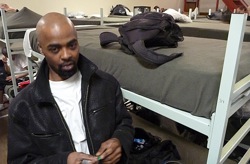Once every four years, politicians descend on a hard luck steel town in Northeast, Ohio called Youngstown.

With a 50 percent poverty rate -- the worst in the country -- Youngstown makes a compelling a campaign speech backdrop, illustrating everything that is wrong with government, or maybe America. Mitt Romney appeared there this week on the eve of Super Tuesday.
The irony of the situation is, of course, that decades of promises have done little to improve the city's lot. Since the decline of the steel industry that was its lifeblood 40 years ago, life has been very hard here for many people here. Despite recent promising efforts to rebuild the city around tech startups and downtown living, there's definitely a class of people being left behind, with few options.
And transportation is at the heart of the problem.
Tom Zeller Jr., writing for the Huffington Post, summed up the problem facing Youngstown's poor:
Exit the Madison Avenue Expressway onto Martin Luther King Jr. Boulevard, just beyond a road sign advertising the Museum of Industry and Labor, and an elegant, pre-war building, red brick and multi-gabled, rises on your right. Built in 1931 and the former home of the West Federal YMCA branch, it is now owned by the Rescue Mission of Mahoning Valley, which houses dozens of this town's homeless residents.
Cleavon McClendon, who recently lost his job working at a Bob Evans restaurant, is among them.
"I lost Bob Evans due to Sundays," says McClendon, 36. "Sundays are their best days, busiest days, and they needed me there on Sundays as much as possible, but I couldn't be there because I don't have transportation and the bus don't run on Sundays. The bus don't run on Sundays, period."
Unable to pay his bills, he then lost his apartment and soon washed up at the side door of the mission. It was not his first time here, and his story is not unusual in a city, and a region, struggling to re-invent itself after the steel industry largely vanished.
Youngstown's WRTA won a major victory four years ago when voters approved a county-wide quarter-cent sales tax, making the system regional. That allowed the system to restore night and Saturday service after a two-year lapse. But in order to make the levy appealing to suburbanites, WRTA had to increase door-to-door service in sparsely populated areas for seniors and those with special needs. But the city service, even greatly expanded, still leaves many urban residents stranded.
Meanwhile, few opportunities remain within the city. Youngstown has struggled even to retain a few grocery stores, let alone major employers. Employment -- especially in the service industry jobs that have replaced manufacturing -- is concentrated in the ever-more-distant suburbs.
The Youngstown-Warren-Boardman metropolitan area was listed as number 97 -- third from the bottom -- in the Brookings Institution's analysis [PDF] last year for the percentage (14) of jobs accessible by transit.





